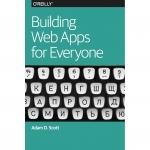Building Web Apps for Everyone, 2016 by Adam D. Scott

Категория: Other
Поделиться:
The opportunity to use the latest technologies is one of the joys of web development, but relying on these new tools has its drawbacks. A surprising number of users (so-called "edge cases") own outdated computers with older browsers, have slow connections, or struggle with physical disabilities that prevent them from accessing today’s sites and apps. How do you strike a balance in your design to include everyone?
In this report, author Adam Scott provides several options and best practices for using progressive enhancement, accessibility design, and inclusive web forms in your application. As the Web continues to play an increasingly large role in our daily lives, these features will help your online product fulfill Tim Berners-Lee’s promise of a global communication network that enables everyone with a connection to participate fully.
- Progressive enhancement: explore several options for making core functionality available, using the simplest technology
- Web accessibility: learn the guidelines and tools that will help you provide people with disabilities access to your site or app
- Inclusive forms: consider name-inclusive fields, internationalization, and non-binary gender options when designing interactive web forms
This report is the first in a series on the subject of ethical web development. Future titles will explore ways to build web applications that work everywhere, show you how to work with and appreciate your peers in development, and how to build web apps that respect a user’s privacy and security. You can learn more about the series at ethicalweb.org.
Скачать
Комментарии